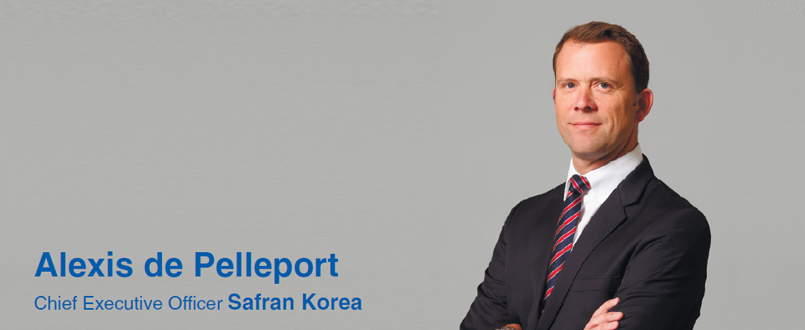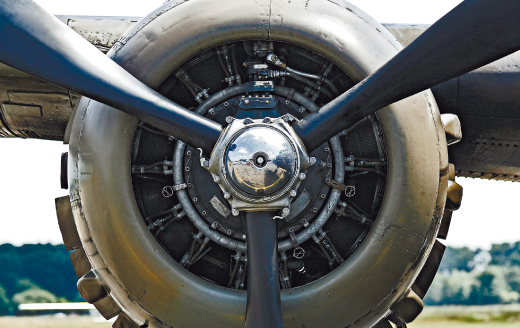

Safran Korea is driving
progress through sustained investment
in partnership and innovation
Despite their geographical distance,
Korea and France have enjoyed one of the
strongest partnerships across the globe.
Since establishing diplomatic ties in 1886,
the two countries have maintained solid
relations in a wide range of sectors. And
to celebrate the 130th anniversary of
Korea-France ties, the two governments
launched the “Years 2015-2016 of Korea-France Bilateral Exchanges” to spur bilateral exchange. But it’s not only the private sector that is bolstering this long spanning partnership—companies like
Safran are as much about defining the
future of Korea-France ties as its past.
Safran, a leading international high technology group, has leadership positions in its three core businesses of aerospace, defense and security. Operating
worldwide, this French company has
70,000 employees and generated sales of
EUR 17.4 billion (USD 18.2 billion) in
2015. Working alone or in partnership,
Safran holds world or European leadership positions in its core markets. In an
interview with Alexis de Pelleport, Chief
Executive Officer of Safran Korea, we
find out more in detail about how the
company is leading the pack in the
world’s aeronautics and defense industries.
For aerospace, Safran covers the entire life cycle of engines powering fixed and rotary-wing civil and military aircrafts:
design, production, testing, sales and sup- port. It also provides systems and equip- ment for civil and military fixed and rotary-wing aircrafts. Our products are used on most current and upcoming regional and business aircrafts, single- aisle and widebody mainline jets. We draw on our broad-based technological expertise to offer complete packages to aircraft manufacturers and operators, including integrated propulsion systems (engine and nacelle), complete aircraft electrical systems and landing systems.
For the defense field, we offer a complete range of systems and equipment for
both civil and military applications in the
key areas of optronics, avionics, navigation, electronics and safety-critical software. Our solutions facilitate the work of
homeland security and police forces, customs, and maritime and mountain rescue
teams. They enhance the efficiency of
armed forces – air, land and sea – in
many countries around the world.
In the security business, Safran spans a
number of applications and technologies,
including detection of explosives and
illicit substances, multibiometric identification, secure ID documents and online
transactions, and much more.
Our solutions help ensure the safety
and security of people, businesses and
countries. They guarantee the security of
transport, high-risk infrastructures and
transactions and enhance the protection
of people and goods.
Safran has been in business with South
Korea for more than 30 years through
some of our subsidiaries.
This relationship, built on mutual trust,
could not materialize without a local
presence of Safran, that’s why the Group
has decided to open a company, which I
am honored to be the first CEO.
The Korean people never cease to
amaze us with their production capacity
and their ability to progress both technologically and in terms of manufacturing
process. This industrial capacity makes

Korea a high potential partner for a large industrial group of high technology like Safran. Korea’s aerospace and defense industry has a bright future.
Even though some Safran’s sub-
sidiaries are well known in Korea
(Turbomeca, Sagem, Snecma, Messier
Bugatti Dowty, Labinal Power Systems),
the brand Safran itself is still not very
well-known, and a lot of Korean compa-
nies, or governments, are not aware that
those companies were 100 percent owned by Safran.
However, our Group has decided to
place all of its subsidiaries under a single
banner and brand name – Safran – to bolster its position as a
global industrial
leader and accelerate its international
growth. The Safran logo therefore
becomes the sole emblem representing all
Group companies.
Safran has taken a major step forward
in terms of its brand image, for the benefit of all stakeholders: customers, partners, shareholders and employees.
Operating under a single brand will
enable Safran to further improve its
recognition across all markets and publics
in Korea. It will also guarantee the enhanced visibility of its businesses and
the products and services it offers.
Safran already equips the three Korean
Armed Forces with optronic systems,
inertial navigation system (INS), helicopter engines and landing gears. Most of
those programs have been conducted in
partnership with local companies.
For example, we have a partnership
with Hanwha Defense for INS, Hanwha
Techwin for helicopter engines and
Huneed for the helicopter flight controls.
In the field of security, Safran provides
Incheon and Busan airports with luggage
explosive detection systems.
Regarding civilian aeronautical industry, we also have some commercial plane
engines flying in Korea.
Our relationship with Korea is not new
and we are confident that given the potential of Korea and the capacity of Korean
people to move forwards and progress,
there are great things to do together in the
future. We are only at the beginning of a
fruitful partnership.